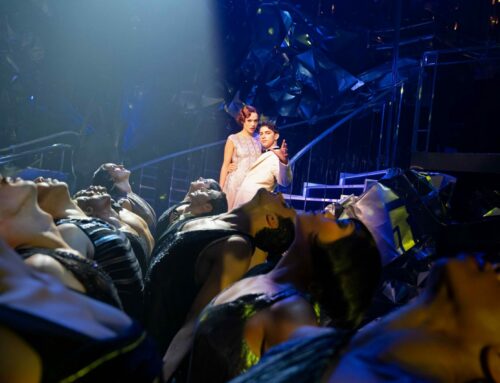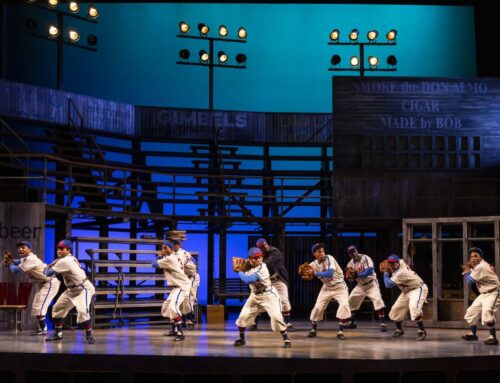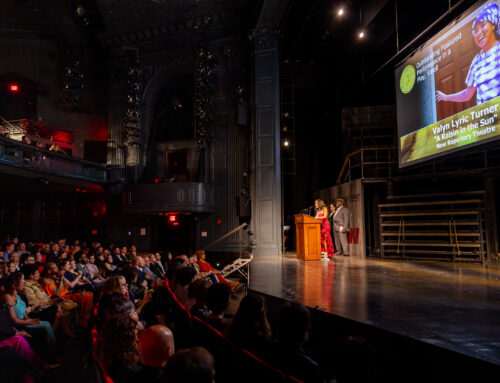Otherness. The state of being unlike whoever “we” think we are and all the issues that follow — fear, power, safety– are the hyper-relevant themes of two recent plays. Both works challenge the outsize dominance of “whiteness” over the non-white global majority, and one play requires the white minority not only to see itself, but also its own gaze from the “other” perspective. SpeakEasy’s Stage Company’s production of Jackie Sibblies Drury’s 2019 Pulitzer-Prize-winning play “FAIRVIEW” is that show and made my head spin as only theater can–as lived, visceral experience on the spot–and how. I urge you to see it.

L.to R. Lindsay Allyn Cox, Dom Carter, Yewande Odetoyinbo, Victoria Omoregie (Photo: Courtesy Nile Scott Studios)
The ingeniously conceived “Fairview” demands meticulous direction, and Pascale Florestal met the moment. The action is set in a carefully appointed, modestly upscale home where the Frasiers a Black American family are preparing GrandMama’s birthday dinner. The mother Beverly (Yewande Odetoyinbo) is peeling carrots on the dining room table while listening to music and dancing. Her husband Dayton (Dom Carter) comes home, they sweetly bicker and flirt about what he forgot at the store, and she worries about everything being perfect that night–what with her troublesome sister Jasmine (Lyndsay Allyn Cox) coming. According to Dayton, Jasmine “never has one good thing to say about anybody” and she’s due any minute along with the Frasier’s teenage daughter Keisha (an especially engaging Victoria Omoregie).
But there are indications that something is askew. Beverly is confused by some of the songs being played over the speaker and stops dancing but soon resumes while preparing the meal. And the acting in these opening moments, with the exception of Omoregie’s, is a tad corny and overbroad. At first I thought this was a miscalculation. Later, I understood the approach to be a deliberate calculation and a hint that what we are looking at may not be real.
Indeed, “seeing” and “being seen” are very much the point of FAIRVIEW with its pun of a title reinforced by the play’s opening line delivered by a startled Beverly to her husband as he sneaks up on her: “What are you looking at?!” Beverly doesn’t like being watched without her knowing it, and shortly Dayton will express similar discomfort at the thought of being spied on by Beverly’s nosy sister, describing Jasmine as a “one-woman FBI NSA KGB.”
Being creeped on is scary and disorienting, and Drury’s play makes one rethink the conscious and unconscious surveillance afoot. I cannot say more specifically what you’re in for here, without spoiling the theatrical experience. I will say that it is exceptionally and even bravely well-acted. The action of the play demands extreme coordination on the part of this terrific ensemble, and required intense focus as I scrambled to keep track of the action and my place in it as the play grew more layered act by act. My expectations upended, I was initially confused–then more than a little shocked as I began to see what I hadn’t ever seen so clearly before. I was somewhat adrift but still charting my course as I walked out of the theater. I overheard others talking as they left: “I thought I knew where I was then suddenly wondered how did we get HERE? ”
We are set up to expect a family sitcom with its familiar tropes: unresolved family tensions, complications/revelations bubbling to the surface, and the action finally resolving and coming in for a soft landing. But there is nothing soft or conclusive about this landing. The last act reverberates like the aftershocks of an earthquake that’s been purposefully constructed to help us find new footing and a fair view. That’s what I call theater. DO NOT MISS SpeakEasy Stage Company’s FAIRVIEW onstage at the BCA’s CALDERWOOD PAVILION through March 11!
ALMA at Central Square Theater is a more conventional but very absorbing work, which embeds the issue of otherness and home inside the relationship of an immigrant mother and her American-born daughter. Written by Benjamin Benne and directed by Elena Velasco, the play finds Alma (Karina Beleno Carney) and her 17 year-old daughter Angel (Luz Lopez) in their apartment in La Puente, California and on the cusp of change in several ways. It’s December 2016 and Trump is about to be inaugurated along with his anti-immigration policies. Angel is due to take her SAT’s the next day where a good score will get her into the college of her mother’s dreams– not hers.
And therein lies the rub. Alma who migrated to America while pregnant with Angel, is still carrying the dream of possibility. She has worked hard to make a path her daughter is reluctant to travel. Angel, a bright student who is coming of age, still fears she cannot compete with wealthy white classmates; they can afford tutors to “spoon feed” them what they need in order to score SAT’s high enough to get into UC DAVIS.
When Alma and Angel begin arguing, they sound like any rebellious teenager and her equally determined mother. But their generational conflict is compounded by deeper issues– Alma’s dreams of success forged in the country she left behind come up against Angel’s fear of failure as the daughter of an immigrant parent. That we know what’s looming politically–the heightened threat of deportation for a mother without papers–makes their conflict more worrisome.
The play reaches for another layer– the mystical: the TV flips on without warning; strange rumblings are heard out of nowhere; there’s a sudden blackout, the earth moves– but all it suggests is the need for an electrician and a good carpenter rather than the hoped for layer of magical realism. The magic is realized in these two performances. Carney and Luz hold the stage alone together for 75 minutes like interlocking cars on an emotional rollercoaster. They hang on as their hopes, dreams, and fears collide, fueled by their generational and cultural differences, but they also hang on to each other as mother and daughter on this difficult ride together, building a life straddling two worlds. We believe every minute of this volatile, complicated, and tender relationship. Though the ending falls flat, there’s much along the way to keep us engaged and elicit compassion for the very real struggles these characters enact. SEE ALMA at Central Square Theater through March 26th!







Leave A Comment
You must be logged in to post a comment.